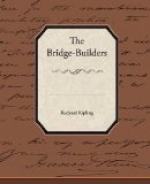Then the troubled beating of the gong carried the order to take up everything and bear it beyond high-water mark, and the flare-lamps broke out by the hundred between the webs of dull iron as the riveters began a night’s work, racing against the flood that was to come. The girders of the three centre piers—those that stood on the cribs—were all but in position. They needed just as many rivets as could be driven into them, for the flood would assuredly wash out their supports, and the ironwork would settle down on the caps of stone if they were not blocked at the ends. A hundred crowbars strained at the sleepers of the temporary line that fed the unfinished piers. It was heaved up in lengths, loaded into trucks, and backed up the bank beyond flood-level by the groaning locomotives. The tool-sheds on the sands melted away before the attack of shouting armies, and with them went the stacked ranks of Government stores, iron-hound boxes of rivets, pliers, cutters, duplicate parts of the riveting-machines, spare pumps and chains. The big crane would be the last to be shifted, for she was hoisting all the heavy stuff up to the main structure of the bridge. The concrete blocks on the fleet of stone-boats were dropped overside, where there was any depth of water, to guard the piers, and the empty boats themselves were poled under the bridge down-stream. It was here that Peroo’s pipe shrilled loudest, for the first stroke of the big gong had brought the dinghy back at racing speed, and Peroo and his people were stripped to the waist, working for the honour and credit which are better than life.
“I knew she would speak,” he cried. “I knew, but the telegraph gives us good warning. O sons of unthinkable begetting—children of unspeakable shame—are we here for the look of the thing?” It was two feet of wire-rope frayed at the ends, and it did wonders as Peroo leaped from gunnel to gunnel, shouting the language of the sea.
Findlayson was more troubled for the stoneboats than anything else. McCartney, with his gangs, was blocking up the ends of the three doubtful spans, but boats adrift, if the flood chanced to be a high one, might endanger the girders; and there was a very fleet in the shrunken channel.
“Get them behind the swell of the guardtower,” he shouted down to Peroo. “It will be dead-water there. Get them below the bridge.”
“Accha! [Very good.] I know; we are mooring them with wire-rope,” was the answer. “Heh! Listen to the Chota Sahib. He is working hard.”
From across the river came an almost continuous whistling of locomotives, backed by the rumble of stone. Hitchcock at the last minute was spending a few hundred more trucks of Tarakee stone in reinforcing his spurs and embankments.
“The bridge challenges Mother Gunga,” said Peroo, with a laugh. “But when she talks I know whose voice will be the loudest.”
For hours the naked men worked, screaming and shouting under the lights. It was a hot, moonless night; the end of it was darkened by clouds and a sudden squall that made Findlayson very grave.




